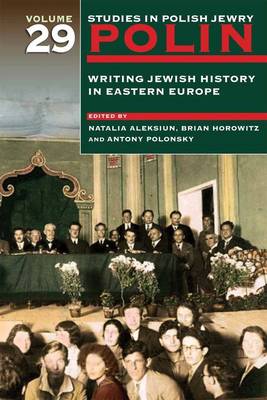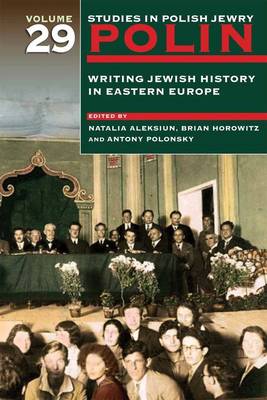
- Retrait gratuit dans votre magasin Club
- 7.000.000 titres dans notre catalogue
- Payer en toute sécurité
- Toujours un magasin près de chez vous
- Retrait gratuit dans votre magasin Club
- 7.000.000 titres dans notre catalogue
- Payer en toute sécurité
- Toujours un magasin près de chez vous
Polin: Studies in Polish Jewry Volume 29
Writing Jewish History in Eastern Europe
Description
Historiography formed an unusually important component of the popular culture and heritage of east European Jewry in the late nineteenth and early twentieth centuries. This was a period of social, economic, and political upheaval, and for the emerging class of educated Jews the writing and reading of Jewish history provided not only intellectual but also emotional and moral sustenance. Facing an insecure future became easier with an understanding of the past, and of the Jewish place in that past.
This volume is devoted to the development of Jewish historiography in the three east European centres--Congress Poland, the Russian empire, and Galicia--that together contained the majority of world Jewry at that time. Drawing widely on the multilingual body of scholarly and popular literature that emerged in that turbulent environment, the contributors to this volume attempt to go beyond the established paradigms in the study of Jewish historiography, and specifically to examine the relationship between the writing of Jewish history and of non-Jewish history in eastern Europe. In doing so they expose the tension between the study of the Jewish past in a communal setting and in a wider, regional, setting that located Jews firmly in the non-Jewish political, economic, and cultural environment. They also explore the relationship between 'history'--seen as the popular understanding of the past--and 'scholarly history'--interpretation of the past through the academic study of the sources, which lays claim to objectivity and authority.
The development of Jewish historical scholarship grew out of the new intellectual climate of the Haskalah, which encouraged novel modes of thinking about self and others and promoted critical enquiry and new approaches to traditional sources. At the same time, however, in response to what the traditionalists perceived as secular research, an Orthodox historiography also emerged, driven not only by scholarly curiosity but also by the need to provide a powerful counterweight in the struggle against modernity. In fact, east European Jewish historiography has undergone many methodological, thematic, and ideological transformations over the last two centuries. Even today, east European Jewish historiography revisits many of the questions of importance to scholars and audiences since its emergence: how Jews lived, both within the narrow Jewish world and in contact with the wider society; the limits of Jewish insularity and integration; expressions of persecution and anti-Jewish violence; and also Jewish contributions to the societies and states of eastern Europe. Many challenges still remain: questions of the purpose of the research, its ideological colouring, and its relevance for contemporary Jewish communities.
The fruit of research in many disciplines and from different methodological points of view, this volume has much to offer scholars of modern Jewry trying to understand how east European Jews saw themselves as they struggled with the concepts of modernity and national identity and how their history continues to be studied and discussed by an international community of scholars.
Spécifications
Parties prenantes
- Editeur:
Contenu
- Nombre de pages :
- 520
- Langue:
- Anglais
- Collection :
- Tome:
- n° 29
Caractéristiques
- EAN:
- 9781906764487
- Date de parution :
- 29-12-16
- Format:
- Livre broché
- Format numérique:
- Trade paperback (VS)
- Dimensions :
- 155 mm x 231 mm
- Poids :
- 861 g






